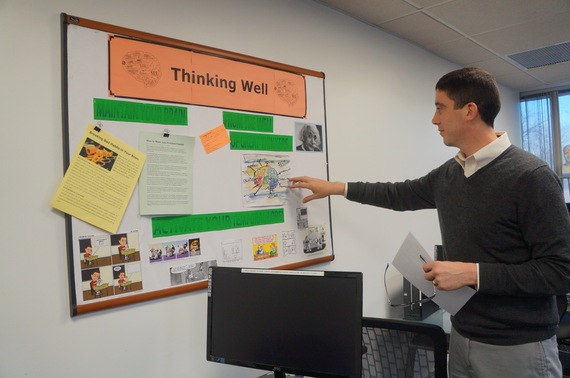
Gregg Pauletti, Laurel House's Thinking Well Coordinator and Education Counselor, in Thinking Well's program space in Stamford, Connecticut. Credit: Katherine Du
Laurel House, a 501(c)(3) non-profit organization serving Fairfield County since 1984, provides the thriving Supported Education and Thinking Well programs.
Funded by private sources and the State of Connecticut's Department of Mental Health and Addiction Services, Laurel House's Supported Education program assists students with severe mental health disorders as they transition into higher education. Since its inception in 1989, Supported Education has worked in collaboration with 16 institutions of higher learning.
"Supported Education's most important feature is giving people hope to successfully enroll or re-enroll in education, giving them really a right to education again. Most people enjoy education at some level but can't access it with mental illness. We see ourselves as partners to help that person succeed, enabling them to participate in self-development. Mental health recovery is lifelong, so for many people, we are their touchstone," said Linda M. Autore, President and CEO of Laurel House.
According to Autore, each Supported Education counselor has a caseload of up to 20 individuals, aiming to help those individuals achieve their case-specific recovery goals. Laurel House clinicians seek scholarships and financial assistance for participants; accompany them to campus; and aid in course selection and the Free Application for Federal Student Aid (FAFSA) application procedure.
"It's all about the process. [Participants] want to go to school, but why? Where are they in the process? What do they want to get out of it? And part of the process is building confidence and meeting milestones: first semester... second semester... requirement courses. It's the process that builds confidence," said Autore.
In tandem with Supported Education, Laurel House's Thinking Well program embraces cognitive remediation, a therapeutic rehabilitation technique pioneered by Alice Medalia, Ph.D., Director of the Lieber Recovery and Rehabilitation Clinic at Columbia University in the City of New York.
Launched in 2014 with private funds, Thinking Well targets individuals debilitated cognitively by mental illness. At the onset of Thinking Well's 30-session computer-based class, participants are assessed on six different cognitive domains: attention, working memory, verbal learning, visual learning, reasoning, and processing speed. Thinking Well's courseware, in turn, adapts to each individual's cognitive needs.
"The functional outcomes--going to school, holding a job, living independently, concentrating for more than ten minutes, reading a book from beginning to end, making eye contact--are the most important because they mean [individuals] can integrate back into the community," said Autore.
Thinking Well specifically targets negative symptoms of mental illness: passive yet socially scathing consequences of mental disorders.
"Negative symptoms contribute more to the impoverished quality of life... something like poor grooming or money management. No medication treats them. Thinking Well focuses on cognition to train people to think and organize their thought processes in such a way that they can do these things better. It's a hopeful, labor-intensive approach," said Jay Boll, Vice President and Editor-in-Chief of Resources to Recover, a family-oriented mental health care website provided by Laurel House.
Dedication to treating the holistic patient rings clearest in Laurel House's logistics.
"Mental health traditionally was treating the symptoms, but now at Laurel House, we really work with the whole person in every aspect of their life, not just occupationally or educationally but also socially and spiritually," said Boll.

